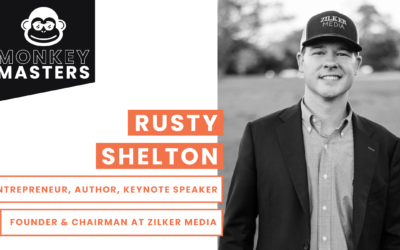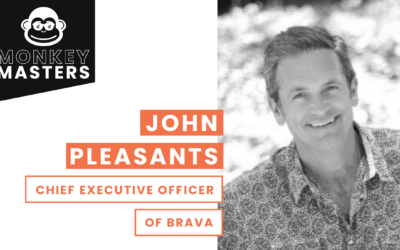For my third interview of Monkey Masters, I am thrilled to interview Jason Dorsey.
Jason is one of the most interesting entrepreneurs I have ever met and his insights, experience and background are truly exceptional. The list of Jason’s accomplishments is too long to do justice (full bio at the end of the interview) – but let’s say he is part-time author, part-time public speaker, part-time soothsayer, part-time investor and full-time amazing human!
Jason is the President of The Center for Generational Kinetics (CGK), the leading generational research, strategy, and consulting firm. He has authored several books including one of my favorites, Zconomy – How Gen Z Will Change the Future of Business and What To Do About it (Amazon link here) – and somehow also finds time to be a husband, father AND serve on the Entrepreneurs Council for Next Coast Ventures. Wow! Getting ready for another amazing Monkey Master, Jason Dorsey!
Why did you decide to become an entrepreneur? What 1-2 things from your life, your upbringing or professional experience drove you to eventually take the plunge into the great unknown?
I remember the exact day and time I became an entrepreneur. It was January 7, 1997, at 1:58 a.m. I was in my college dorm room near The University of Texas at Austin. I was sitting at my tiny dorm room desk. One of those desks that are permanently attached to the wall. I had been reading books about finding your own path and realized that my path was not the one I thought it was since I was a little kid. Instead, it was something entirely different. And at that moment, I decided to drop out of college to write a book, start my own company, and do my best to help my generation. I had no idea what I was getting into, only what I was leaving behind. I was 18 years old, a junior in the UT Business Honors Program, and had lots of great job opportunities—and I was instead jumping head first directly into the unknown.
Later that morning, I called my dad to tell him the news. I’ll never forget the conversation. He couldn’t believe I was dropping out of college. He said to not call him again until I re-enrolled and then he hung up. My parents are divorced, so I then called my mom. She was shocked and in disbelief. She thought I just needed some of her homemade chicken soup and that would get me fixed right up and back in class. I passed on the soup and instead started writing my first book at my tiny dorm room desk.
Five months later, I self-published the book, started my own business, turned 19 years old, was $50,000 in debt, and sleeping on the hard floor of a tiny garage apartment. No furniture. No business plan. No idea what was going to happen next. Just a burning desire to start a business that helped my generation. I had never felt more alive or inspired—even though I had no idea how gruelingly difficult the journey would be at times or how incredible the experiences were to come.
What drove the decision to become an entrepreneur? We had a guest speaker who said, “if your goal in life is money you’ll never have enough.” His message stung me because I thought if I just made enough money everything else would work out, but he helped me to see that was not the case. That what I needed to do was find a path that lit me up without making money. It really challenged my thinking and, ironically, is what led me to become an entrepreneur. He helped me to see that there was no better time than right now to start my own business and follow my newfound passion, but it had to be a complete commitment. The hardest part for me was not when I was asking people to loan me money to pay to print my book, or sleeping on the floor every day, or being broke and calling and emailing potential customers and getting rejection after rejection after rejection.
The hardest part for me was suddenly being on a different path than my peers and friends at age 19. They were going to classes or going to their job and going out on weekends. I was working. Seven days a week. I felt like I was on an island trying to start a business. It was during this time that I found my mentors—most of whom are entrepreneurs—and they became the group of guides who helped ask the questions that ultimately enabled me to find traction and keep believing in myself even when I would have days of doubt. I also will never forget getting hired to deliver my first paid speech which was the first real revenue for my business. It was about two months after I self-published my book.
The unexpected catch was that the paid speech was out of town and I was too young, at freshly 19 years old and still in braces(!), to rent a car or a hotel room at the conference hotel. So I had to call my mom and ask her if she would drive me to the hotel and rent a room for me to stay! Talk about an awkward request after I’d dashed her dreams for my future by me dropping out of college. She agreed to take me. At the end of my speech at the conference, I got a standing ovation and sold out of books. I also got hired by numerous people in the audience to speak and it became the start of my business actually generating revenue! It was an incredible feeling to actually get paid for what I discovered I loved to do. So I kept speaking, writing, and growing my business.
I went on to win the Austin Under 40 Entrepreneur of the Year at age 25, make the Inc 5000 and Austin Fast 50, and eventually appear on over TV shows such as 60 Minutes and The Today Show. The first book I wrote ended up becoming a national bestseller. All these years later, I still love working with, investing in, and helping entrepreneurs who are willing to go all-in on a vision that even their parents and friends may not believe. The college I dropped out of eventually made me an honorary graduate, which made my dad happy, too! Every year I drive with my daughter past the tiny garage apartment where I slept on the floor and my entrepreneurial journey really took hold. And every year she still can’t believe it.
What mental hurdles held you back and how did that manifest itself in your leadership/decision-making/personal well-being?
I’m very focused when it comes to work ethic, continuous improvement, and driving forward on a business. That has proved immensely valuable in overcoming challenges from fundraising and generating initial sales to driving innovation—all of which have been key assets in the businesses I’ve started and built. However, that intensity can make it hard to find balance and create much-needed room for the other areas of my life. For 15+ years I was traveling 200 to 250 days per year. I even won American Airlines Road Warrior of the Year—seriously. So for the last several years I’ve worked harder at creating space to be with my family, friends, and get in great physical shape. Even just taking a vacation was something I had not done for years and, frankly, needed to get better at doing.
One major catalyst was my wife and I starting our research company together, CGK. Working with her every day—and seeing her focus on scalable systems and processes—helped me to reframe how I used my time. With the birth of our daughter, I also started thinking very differently about my travel calendar which, ironically, enabled our business to grow much faster because we hired more executive talent to drive the company forward.
What one piece of advice would you give to your previous self when you were first starting out?
Focus on businesses with recurring revenue! I learned that one way later than I should’ve.
What was the biggest surprise for you about being an entrepreneur? What do you know now that you wished you knew then?
The biggest surprise for me is how being an entrepreneur can instantly connect you with other entrepreneurs. For me, I’ve been an entrepreneur my entire adult life. I’ve never had a job since I was 18 years old. Not one. I’ve served on lots of corporate boards, including a company that was acquired for 11 billion dollars, been in many great business partnerships, and been a retained advisor for huge global brands and fast-growing startups, but I’ve not been a W-2 employee since I was 18 years old.
I’ve found being an entrepreneur gives me an instant sense of connection and understanding with other entrepreneurs that I never expected but I see consistently, no matter where I travel in the world and the types of industry or size of business that the other entrepreneur might lead. I find that sense of connection really inspiring, almost like a common language or set of stresses and experiences that give us an instant starting point for conversation, trust, empathy, and inspiration.
One thing I wished I knew then that I know now is that when you’re an entrepreneur you’re not really alone, it may just feel that way at different moments and periods of time. This was a big learning for me in my early days as an entrepreneur. I didn’t really have any peers or others to talk to about my experiences, struggles, fears, and breakthroughs. I eventually put together a group of 6 entrepreneurs around my age and we’ve been meeting monthly for more than 15 years! Being able to share experiences, challenges, and wins with a trusted group of other entrepreneurs, even though they’re in different industries than my own, has been a tremendous asset to me and something I strongly recommend to other entrepreneurs.
Who are your entrepreneurial (or life) heroes?
My entrepreneurial heroes are my mom and dad. They each ran their own small businesses that supported our family. They worked hard and basically risked their personal finances in order to create businesses from the ground up that provided for our needs. Ironically, both of them had to eventually close down their businesses—which was an entirely different set of lessons I still carry with me.
I have a voice in my head that fills me with fear, uncertainty and doubt. I call him Mr. Monkey. Do you have a voice like him? How does he try and screw with you? How do you quiet him (or her or it) down?
As an entrepreneur, I can point to so many moments of fear, uncertainty, and doubt. I remember when my wife left her stable job and a great career for us to start our research company together. We had no clients, no revenue, no company name(!), and a lot of bills. I remember thinking what on earth are we doing? But, just as I do now, I find something I can go to work on that moves the business forward and eventually we move forward.
I also learned that I can break through that fear, uncertainty, and doubt by getting back to work. I remind myself to stop thinking about all the “what ifs” and switch to “what can I do right now”. That always helps me to see I can still influence what happens next with the business. I then can work on adjusting the plans or strategy, but I need to get out of the head trash of doubt and instead stay in the game.
Jason Dorsey Full Bio (linked in here)
Jason Dorsey is a pioneering Gen Z, Millennial, and generations speaker, author, and researcher. He is on a mission to separate generational myth from truth through data to solve strategic challenges for leaders. Jason has received more than 1,000 standing ovations for his unique presentations and headlined events around the world, from India, Singapore and Switzerland to Chile and Finland, the UK, and France. Jason is also President of The Center for Generational Kinetics (CGK), the leading generational research, strategy, and consulting firm. CGK works with more than 100 clients annually to solve tough generational challenges—in areas from sales and marketing to recruiting and innovation across generations. CGK’s PhD-led team has conducted more than 65 generational studies on four continents in multiple languages. Jason’s latest bestselling book is Zconomy: How Gen Z Will Change the Future of Business—and What to Do About It. This breakthrough book was a #1 New Release on Amazon. Forbes listed it as a Top 10 Business Book of 2020. Zconomy is published in five languages.
—
A huge thank you to my friend Jason for participating in Monkey Masters! Be sure to be on the lookout for my next interview and all future blogs here.
AND if you haven’t yet… be sure to take The Entrepreneur Survival Test and test your skills.


